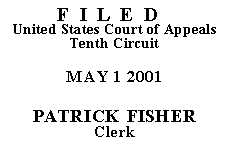

| THOMAS E. CHANDLER,
Plaintiff-Appellant, |
|
| v. | |
| CITY OF ALBUQUERQUE POLICE
DEPARTMENT,
Defendant-Appellee. |
|
Thomas E. Chandler appeals the district court's dismissal of his 42 U.S.C. § 1983 civil rights action against the City of Albuquerque Police Department for failure to state a claim. We have jurisdiction under 28 U.S.C. § 1291 and affirm.
Chandler filed his complaint on June 23, 2000, alleging violation of his freedom of speech. Chandler alleged the police had made defamatory statements concerning him and prevented him from telling his "one and only true love" that he loved her. His complaint was dismissed on October 13, 2000, for failure to submit the statutory filing fee or a motion for leave to proceed in forma pauperis. On October 24, 2000, Chandler filed an application for leave to proceed in forma pauperis. The district court reopened the proceeding and directed Chandler to pay the filing fee. On November 30, 2000, the district court dismissed the complaint for failure to state a claim upon which relief could be granted.
We review dismissal for failure to state a claim de novo. See Davis-Warren Auctioneers, J.V. v. Federal Deposit Ins. Corp., 215 F.3d 1159, 1161 (10th Cir. 2000). "Although speech is generally protected, the Supreme Court has 'long recognized that not all speech is of equal First Amendment importance. It is speech on "matters of public concern" that is "at the heart of the First Amendment's protection.'" U.S. Healthcare, Inc. v. Blue Cross of Greater Philadelphia, 898 F.2d 914, 928 (3d Cir. 1990).
We have reviewed Chandler's appellate brief and the record on appeal and conclude Chandler can prove no set of facts in support of his claim that would entitle him to relief. See Davis-Warren, 215 F.3d at 1162.
Chandler's Motion to Submit Police Report and Letter for Part of Court Records is granted. AFFIRMED.
Entered for the Court
Mary Beck Briscoe
Circuit Judge
*.This order and judgment is not binding precedent, except under the doctrines of law of the case, res judicata, and collateral estoppel. The court generally disfavors the citation of orders and judgments; nevertheless, an order and judgment may be cited under the terms and conditions of 10th Cir. R. 36.3.